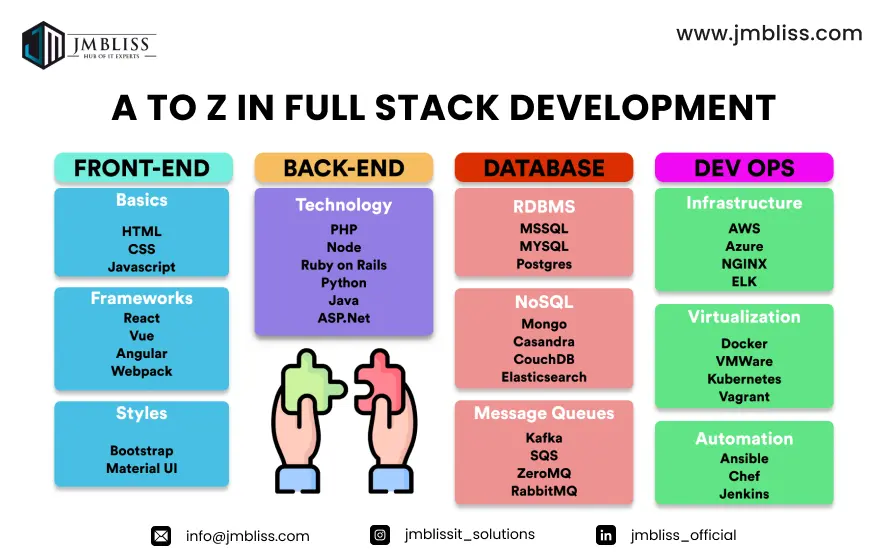88YTY News Hub
Stay updated with the latest trends and news.
Full-Stack Development: The Swiss Army Knife of Coding
Unlock the secrets of full-stack development—your ultimate coding toolkit! Discover why it's the Swiss Army knife for today’s tech world.
What is Full-Stack Development and Why It's Essential for Modern Web Projects?
Full-stack development refers to the comprehensive approach of developing both the front-end and back-end of web applications. A full-stack developer is proficient in every layer of web development, which encompasses the user interface, server-side logic, and database management. This versatility allows developers to understand and implement the complete flow of application data, facilitating smoother communication between team members. As modern web projects grow in complexity, the demand for developers with such extensive skill sets continues to rise.
In today's fast-paced digital landscape, full-stack development is essential for a variety of reasons. First, it fosters greater flexibility and agility in project management. With a developer capable of handling both the front-end and back-end, teams can adapt to changing requirements without the need for multiple specialists. Additionally, having a deep understanding of the entire development process empowers full-stack developers to identify and solve problems more efficiently, ultimately leading to quicker project turnarounds and improved user experiences.

Top 10 Skills Every Full-Stack Developer Should Master
As the demand for full-stack developers continues to rise, mastering a diverse set of skills becomes crucial. Here are the Top 10 Skills Every Full-Stack Developer Should Master:
- HTML & CSS - These are the foundational building blocks of web development, essential for structuring and designing web applications.
- JavaScript - A must-know programming language that allows developers to create dynamic content and interactive features.
- Databases - Understanding both SQL and NoSQL databases is vital for data storage and retrieval.
- Backend Development - Proficiency in server-side programming languages, like Node.js or Python, to handle business logic.
- Version Control/Git - Essential for tracking changes and collaborating with other developers.
- Containerization - Familiarity with Docker or similar tools for streamlining deployment processes.
- Package Management - Understanding package managers, such as npm or Yarn, to manage project dependencies.
- API Development - Skills in designing and integrating APIs are critical for communication between frontend and backend.
- Frameworks - Proficiency in frameworks like React, Angular, or Vue.js can significantly improve frontend development.
- Cloud Services - Knowledge in cloud platforms, such as AWS or Azure, is increasingly important for scalable application deployment.
How Full-Stack Development Can Enhance Your Career Opportunities
In today's technology-driven job market, full-stack development has emerged as a vital skill that can significantly enhance your career opportunities. Full-stack developers possess the ability to work on both the front-end and back-end of web applications, making them highly versatile and valuable in various industries. By mastering technologies such as HTML, CSS, JavaScript, and server-side languages, developers are not only proficient in creating user-friendly interfaces but also in managing databases and server operations. This broad skill set allows professionals to take on diverse roles, from web developer to project manager, which in turn can lead to increased job security and higher salary potential. To learn more about the advantages of full-stack development, check out this informative article on Codecademy.
Moreover, the demand for full-stack developers continues to grow, as businesses increasingly seek technology professionals who can handle multiple aspects of application development. According to a recent report by the Bureau of Labor Statistics, the job outlook for web developers is expected to rise by 8% from 2019 to 2029, which indicates a robust market for those with comprehensive development skills. In addition to higher employability rates, full-stack developers often enjoy the flexibility of remote work and freelancing opportunities, providing them with greater control over their career paths. Embracing full-stack development not only equips you with essential skills but also opens doors to exciting professional possibilities.